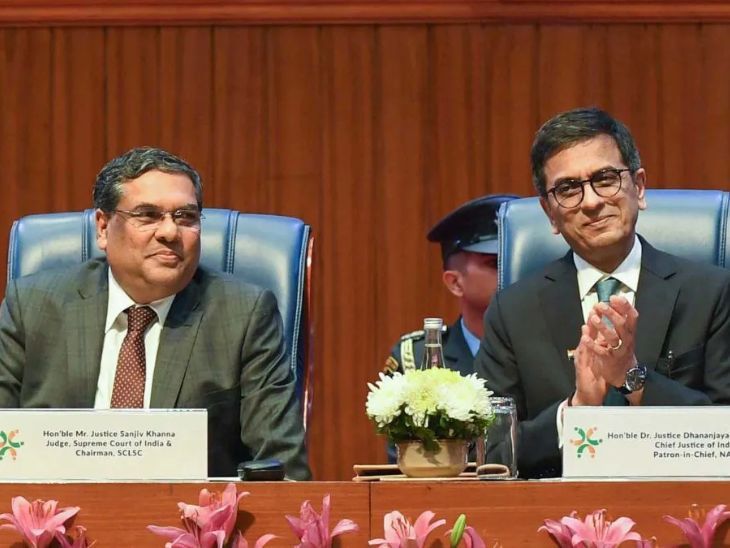Justice Sanjeev Khanna has written around 117 judgments. He has been part of 456 benches so far. Source – Supreme Court Observer
Justice Sanjeev Khanna will be the 51st Chief Justice of the Supreme Court. CJI DY Chandrachud recommended his name to the government. In fact, CJI Chandrachud will retire on November 10, 2024.
Traditionally, the incumbent CJI recommends the name of his successor only when requested to do so by the Ministry of Justice.
After CJI Chandrachud, Justice Sanjiv Khanna’s name appears in the seniority list. This is why Justice Khanna’s name was proposed. However, his mandate will only last 6 months.
Justice Khanna, 64, will retire on May 13, 2025. As a judge of the Supreme Court, Justice Khanna has authored 65 judgments. During this period, he was part of approximately 275 benches.
Judge of the Delhi High Court for 14 years Justice Sanjiv Khanna was born on May 14, 1960. He studied law at the Campus Law Center of Delhi University. After his graduation, he registered as an advocate with the Bar Council of Delhi in 1983. Before being appointed as a judge of the Supreme Court, he served as a judge of the Delhi High Court for 14 years. He was elevated to the Supreme Court in 2019.
There was controversy over becoming a Supreme Court justice There was a huge controversy over making Justice Khanna a Supreme Court judge by ignoring 32 judges. On January 10, 2019, the Collegium decided to promote Justice Maheshwari in his place and Justice Khanna, 33rd in seniority. After this, the recommendation was signed by President Ramnath Kovind.
Two cases of CJI ignoring seniority, both from Indira government In April 1973, AN Ray was appointed as CJI, bypassing three senior judges of the Supreme Court. When Justice Ray retired in 1977, Justice HR Khanna was the most senior. But Justice MH Baig was chosen in his place. During the Emergency, Justice Khanna had passed judgments against Indira’s government, Justice Sanjeev Khanna is her nephew.
Justice Sanjeev Khanna’s father, Justice Devaraj Khanna, was also a judge of the Delhi High Court. His uncle, Justice Hansraj Khanna, was also a Supreme Court judge. It is a rare coincidence that Justice Sanjiv Khanna began his first day as a Supreme Court judge in the same courtroom where his uncle, the late Justice HR Khanna had retired.
He recused himself from hearing the same-sex marriage case. 52 review petitions on same-sex marriage were scheduled to be heard in August 2024. But just before the hearing, Justice Sanjeev Khanna had recused himself from the case. According to sources, Justice Khanna cited personal reasons for this decision.
The separation of Justice Khanna will necessitate the formation of a new panel of five judges to consider review petitions. Only then can they be heard.
Indeed, on October 17, 2023, he refused to legally recognize same-sex marriage. 52 petitions were filed with the Supreme Court demanding a review of the decision.
Famous cases of Justice Sanjeev Khanna
100% Verification of VVPAT- In the case of Association for Democratic Reforms vs Election Commission of India (2024), a bench of Justice Khanna had rejected the ADR’s plea seeking 100% VVPAT verification of votes cast on electronic voting machines. In the judgment, Justice Khanna wrote that he wanted to put on record all the security measures taken by the Commission to ensure free and fair elections.Electoral Bond Program – In 2024, a five-judge bench declared the election bond system unconstitutional. Justice Khanna agreed and wrote that if donations are made through banking channels, donors have no right to privacy. Their identity is asymmetrically known to the individual and the officials of the bank from which the bond is purchased.Repeal of article 370- In 2023, Justice Khanna concurred with the judgment of a bench of five judges which upheld the validity of the abrogation of Article 370. He held that Article 370 of the Indian Constitution was a hallmark of federalism and not a sign of sovereignty. Its repeal does not negate the federal structure.The Supreme Court has the right to grant divorce. In 2023, Justice Khanna wrote the majority opinion in Shilpa Shailesh v Varun Srinivasan, which held that the Supreme Court has the power to grant divorce directly under Article 142 of the Constitution. He argued that the Supreme Court can grant divorce in cases of irretrievable breakdown of marriage in order to provide complete justice.

